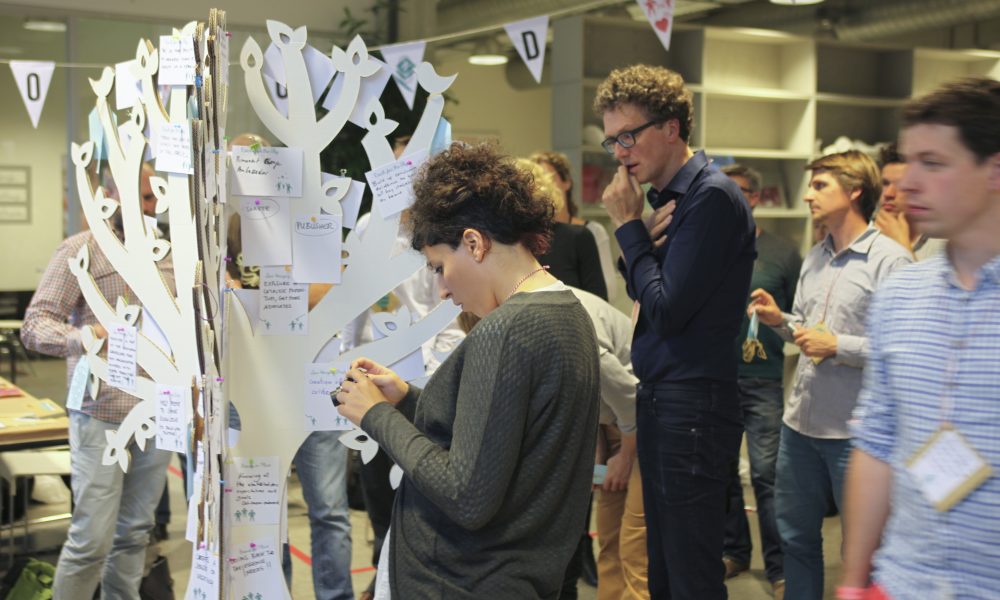Considerate Transformation
More and more organisations in both public and corporate sector engage design researchers to help them transform from being primarily driven by internal perspectives to interacting more collaboratively and sustainably with the outside world. Human-centred, ethnographic research and design-driven service innovation play an important role in this transformation, encapsulating both global and local perspectives in a multinational and multidisciplinary approach.
The overall theme for GOOD19 is ‘Considerate Transformation’. Rather than identifying and developing solutions to any need or demand, collaboratively considering the added value for the wider ecosystem of individuals, groups and environments is key. This holistic perspective is a natural extension of the by now widely accepted human centred design approach to service innovation.
9:00 GOOD MORNING
Registration and informal networking
Welcome and introduction to the conference
Keynote presentation by Sophie Thomas (Thomas.Matthews, UK)
11:00 Parallel sessions
- Designing (and surviving) for the end of life
How can we design for different layers related to the end of life – individual, community, household, society, government, policy, and the built environment? And how do you care for yourself when you’re doing such projects? By László Herczeg (The Care Lab, Spain and Singapore) and Chris Marmo (Paper Giant, Australia) - Fostering local narratives to build resilience
How do you use community narratives as a ground-up, sustainable foundation for building resilience and better futures? Organic, traditional knowledge and skills, as well as local and systemic models of ownership can help.
By Babitha George (Quicksand, India) and Rikke Ulk (Antropologerne, Denmark)
- Redefining communities through entrepreneurship
Modern economies are redefining new work norms and forms, from the gig economy to global online shops for local artisans. How does this open up new possibilities for community sustainability, from Japan to South Africa?
By Yuki Uchida (Re:public, Japan) and Cal Bruns (Matchboxology, South Africa)
- Encouraging behaviors that make meaningful work
What do we wish the future of work to be? How can we move from a bureaucratic narrative, to a humanistic one? This conversation will explore the importance of reflective practices to make everyone’s work more meaningful.
By Josephine Wong (Apogee, China) and Nicolas Gaudron (idsl, France)
13:00 Lunch in the great outdoors (weather permitting…)
14:00 GOOD AFTERNOON
Recap and introduction to the afternoon program
Keynote presentation by Richard van der Laken (What Design Can Do, NL & global)
15:00 Parallel sessions:
- Facing global climate challenges with local interventions
The biggest global problems need local answers, from climate change to how we deal with plastic waste. We will discuss how designers can make a difference and try out together how we can apply the lessons we learned in Amsterdam, Delhi, Mexico City, Nairobi and São Paulo.
By Jose de la O (Studio de la O, Mexico), Camila Boga (flutter innovation, Brasil), Ayush Chauhan (Quicksand, India) and Bas Raijmakers (STBY, UK & Netherlands)
- Inspiring reflective practices among professionals
What frames and lenses can we use to see practices that may be hidden from view in our professional work? We will explore the kind of environments that encourage a healthy discourse about our work, and how we can create these.
By Lekshmy Parameswaran (The Care Lab, Spain and Singapore) and Dan Szuc (Apogee, Hong Kong)
- Converting stakeholder resistance into engagement
Whether the distance between client and consultant is social, emotional, or cognitive, a strained relationship can make consulting impossible to perform. This workshop will engage you in emergent practices for closing the distance between ‘us and them’.By Michael Davis Burchat (Big Human, Canada) and Slava Kozlov (Summ()n, Russiaand Netherlands)
- Empowering people to take charge in care
How do new technologies (self testing, self monitoring, wearables, youth engagement with mental health, contraceptive needs) lead to agency and empowerment in care? We will explore how design research can facilitate a stronger connection between people and their own health and well being.
By Avinash Kumar (Quicksand, India) and Cal Bruns (Matchboxology, South Africa)
17:00 GOOD EVENING
Plenary discussion with joint reflection on results of the day and ambitions towards next steps
Closing drinks and informal networking
18:00 GOOD BYE
(Plenty of options for continued socialising at the cafes along the canal just outside the conference venue)
Take a look at the Speakers Page for more background information on the people you’ll meet at GOOD19
Healthy, Happy and Honest
By connecting the levels of individuals, community and the environment, global design research supports a transition process that is life-centred and evolving towards positive and sustainable change around the world. Through a combination of both presentations and discussions GOOD19 explores how to best contribute to real and meaningful change.
What innovations regarding care, work and planet does design research bring about, from India to Australia? How are large corporations and public sector institutions innovating themselves on a systemic level, from Mexico to China? What does it mean for organisations in USA, Spain or Denmark to move forward towards being a more human and sustainable business? And what local approaches, from Brazil to Russia, from the UK to Indonesia and South Africa, inspire new empathic collaborations in design research? What does this all mean to local fieldwork and global analysis? And what value is being created by involving multiple stakeholders so heavily in design research and service innovation?
